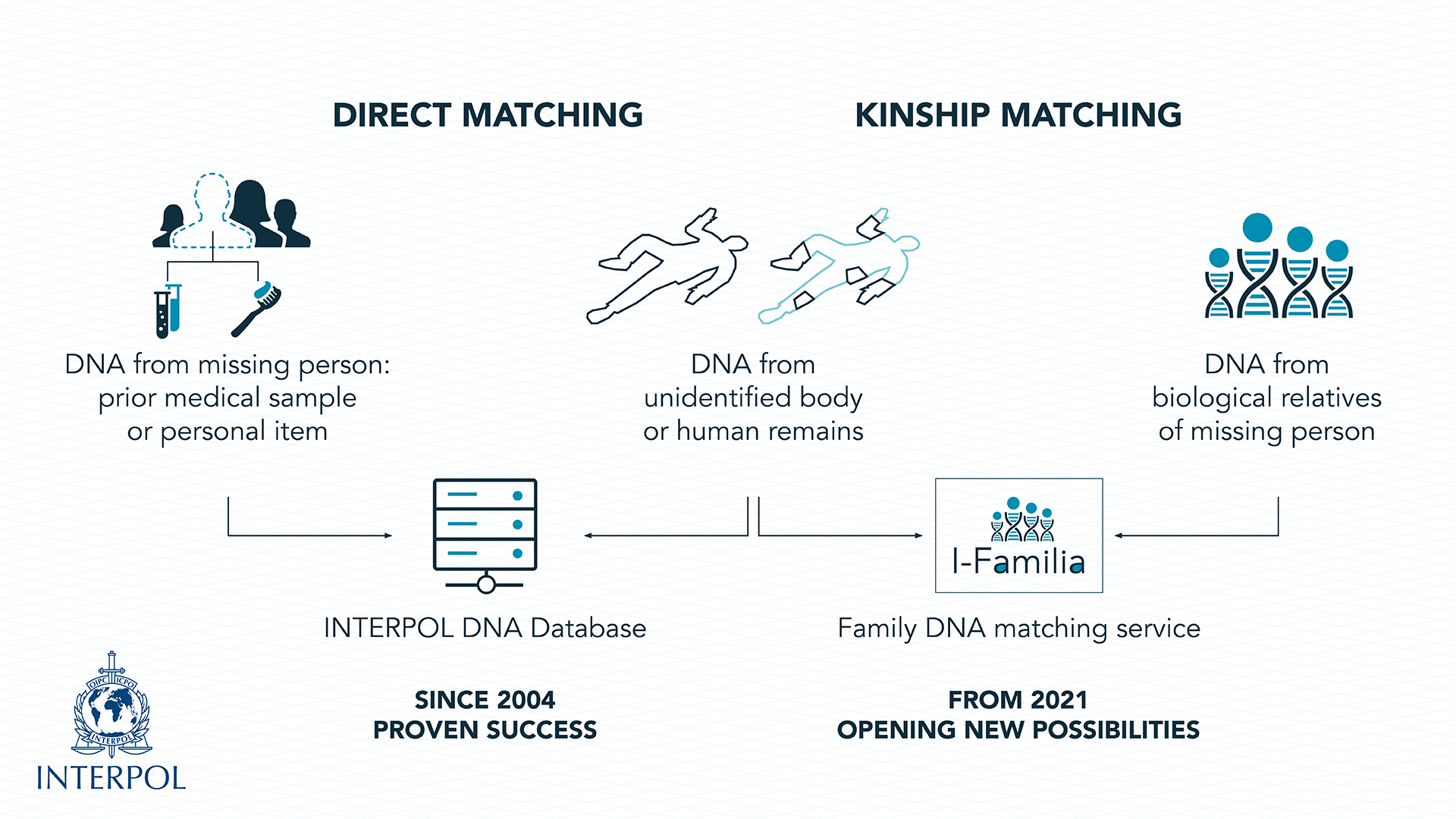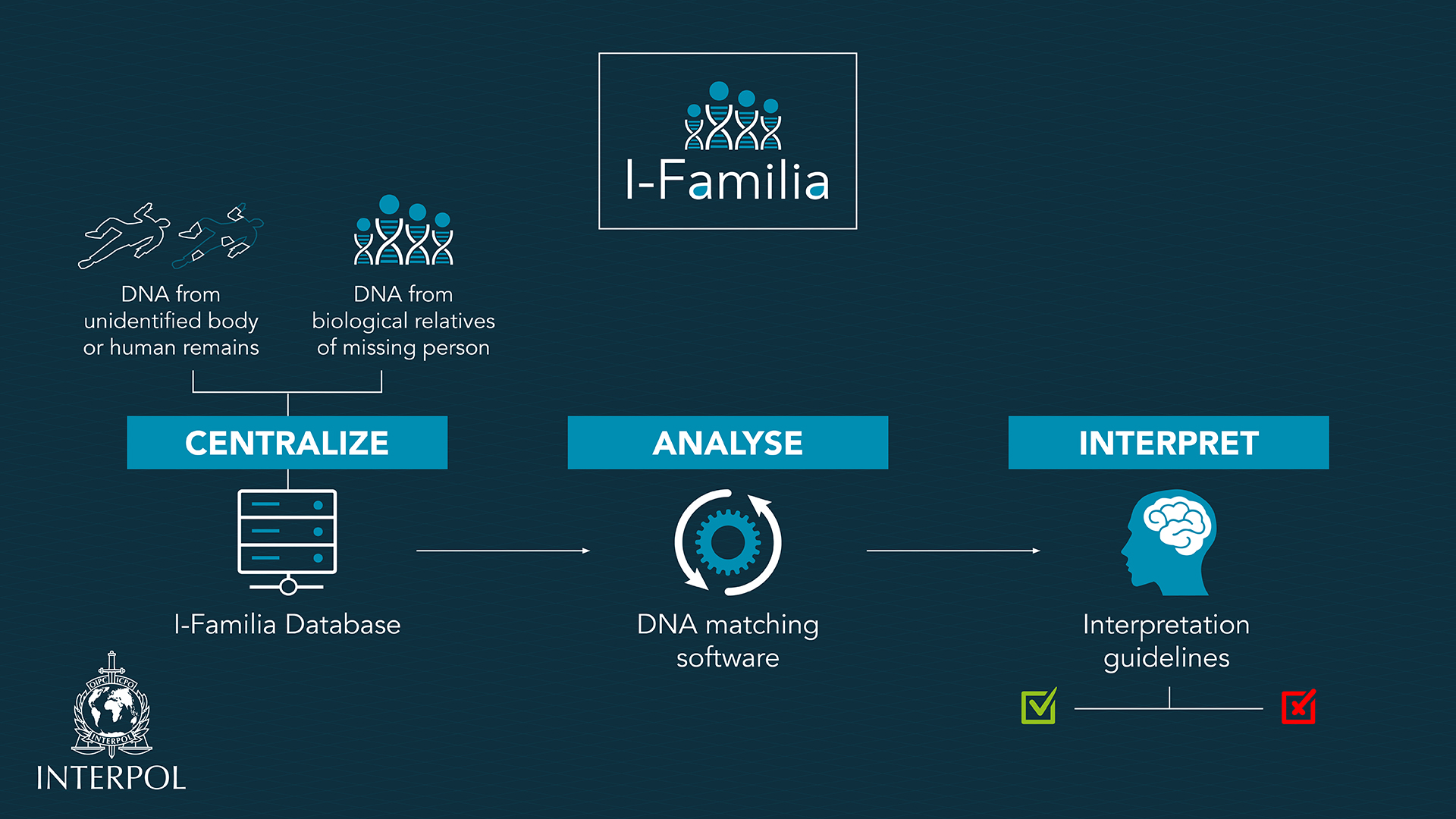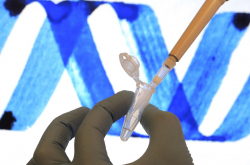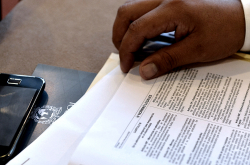The first of its kind, I-Familia is a global database for identifying missing persons based on international DNA kinship matching.
The result of cutting-edge scientific research, the database seeks to identify missing persons or unidentified human remains when direct comparison is not possible, by using DNA samples from family members instead.
This is a complex process – even more so when carried out internationally – which is where INTERPOL can play a unique role through its global network.
I-Familia helps to reunite loved ones or to bring closure to cases and allow families to rebuild their lives.
The missing, and the impact on their families
There is growing international concern about the number of missing persons and unidentified victims around the world due to increased international travel, the prevalence of organized crime and human trafficking, the rise in global migration, conflicts and natural disasters.
Families of a missing person face continued distress from not knowing where their loved one is, often waiting years for news. Depending on the legislation in their countries, families might not be issued with a death certificate, which can have administrative and economic implications.
In cases where a missing person has died because of a criminal act, families are also denied an opportunity to seek justice.
INTERPOL’s global role
All countries have unsolved missing persons investigations as well as human remains that cannot be identified using their national systems alone.
INTERPOL’s I-Familia service provides the necessary international mechanism to allow missing persons DNA data to be compared globally.
Two types of DNA identification
In the absence of identifiers such as fingerprints or dental records, DNA may be the only feasible means of identification. Missing persons identification can be achieved either by direct comparison or by kinship DNA matching.
DNA identification through direct matching
A direct DNA sample from the missing person, for example a prior medical sample or a personal item such as a toothbrush, can be compared to the DNA from an unidentified body or human remains to see if a match can be found. This type of identification has been carried out via the INTERPOL DNA Database since 2004.
DNA identification through kinship matching
Biological relatives share a percentage of their DNA, depending on their relationship. In the event that a DNA sample from the missing person cannot be obtained for direct matching, DNA from close family members (parents, children, siblings) can also be compared. This is where I-Familia is set to make a difference.

How I-Familia works
Building on INTERPOL’s long-standing success in direct DNA matching, I-Familia is a pioneering new service that can perform complex DNA kinship calculations on profiles stored in the system. These profiles are submitted by member countries in order to make links between missing persons and cases related to human remains.
I-Familia is made up of three components:
- a dedicated global database to host the DNA profiles provided by relatives, held separately from any criminal data;
- the DNA matching software, called Bonaparte, developed by Smart Research
- interpretation guidelines, produced by INTERPOL, to efficiently identify and report potential matches.
The Bonaparte technology uses advanced statistical algorithms to calculate the probability of a match compared against an interpretation table. This powerful software can perform millions of calculations in a short space of time. The result is then interpreted by forensic DNA experts at the INTERPOL General Secretariat.
In the event of a match, notifications are sent to the countries that supplied the DNA profile from the unidentified body and from the family respectively. Further checks (such as dental records and personal belongings) can be carried out to confirm the potential match.

Data protection
The processing of DNA data via INTERPOL is carried out via secure communications channels and in compliance with the Organization’s robust data protection rules as well as the INTERPOL policy on using family DNA profiles of missing persons for kinship matching.
Family members must give their consent for their data to be used for international searching. There is no nominal data attached to the profile, which is submitted in the form of an alphanumerical code. INTERPOL’s Constitution and commitment to neutrality mean that I-Familia does not collect or use any data related to race. Member countries retain ownership of the DNA profiles submitted.
I-Familia is applied only to missing persons in a dedicated database and is not connected to INTERPOL’s criminal databases.
What you can do
While I-Familia can be accessed only by authorized staff of the DNA Unit at the INTERPOL General Secretariat, we encourage families, humanitarian organizations and police worldwide to contribute.
- Families of missing persons and missing persons associations: if you are interested in contributing family DNA samples for matching via I-Familia, contact your national police which will liaise with your country’s INTERPOL National Central Bureau.
- Police: please contact the INTERPOL National Central Bureau for your country.
- INTERPOL National Central Bureaus: forward your request or submit data to the INTERPOL DNA Unit via I-24/7.
Scientific review
For the purposes of scientific validation and transparency, the scientific rationale behind I-Familia was published in the peer-reviewed journal Forensic Science International – Genetics.
Partners
I-Familia is powered by Bonaparte, a forensic DNA matching software system developed by SMART Research. SMART Research provides the software system, maintenance and support to INTERPOL.







